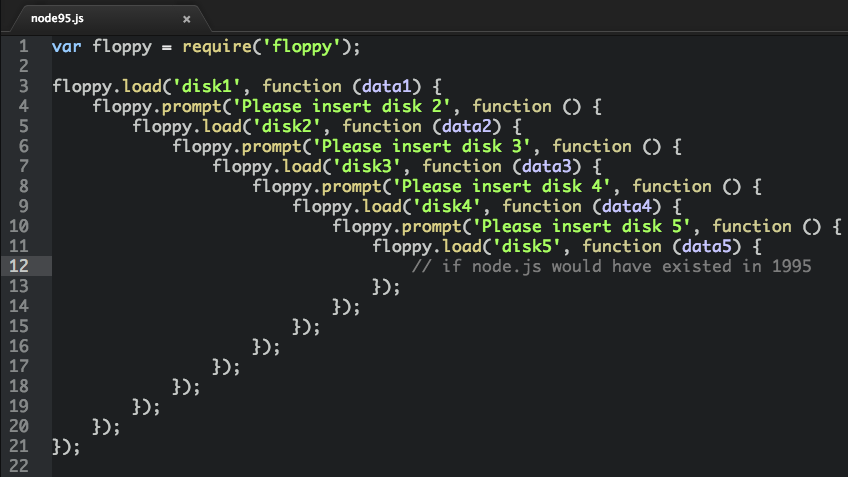The slides are available here: http://orkon.github.io/es6-slides/#1. Below is the copy of the slides:
Agenda
- Intro
- Assignment Destructuring ✗
- Spread and Rest (not REST) ✗
- Arrow Functions ✓
- Template Literals (Strings) ✓
- Classes ✓
- Let this var be const ✓
- Symbols ✓
- Iterators ✓
- Object Literals ✓
- Generators ✓
- Promises ✓
- New Data Types ✓
- New Methods ✓
- Proxies ✗
- Reflection ✗
- Strings and Unicode ✓
- Import/Export ✗
- ES2016 / ES7s ✗
✓ - available in node 4.2., ✗ - not available in node 4.2.
Intro

- ES5 standardized in 2009
- ES6 == ES2015 (standardized in June 2015)
- ES7 == ES2016 (soon)
Assignment Destructuring ✗
ES6
let { clone } = lodash;
let { clone: myClone } = lodash;
let { first, , third } = [1, 2, 3];
function foo({a = 1, b = 3}) {
// a and b available
// a === 1, b === 3
}
ES5
var clone = lodash.clone;
var myClone = lodash.clone;
var first = [1, 2, 3][0]; // etc
function foo(obj) {
var a = obj.a || 1;
var b = obj.b || 3;
}
Source/Details: https://ponyfoo.com/articles/es6-destructuring-in-depth
Spread and Rest (not REST) ✗
ES6
function(...args) {
// args instanceof array === true
}
[head, ...tail] = [1, 2, 3, 4];
// head === 1, tail === [2, 3, 4]
new Date(...[2014, 1, 1]);
ES5
function(/* arguments */) {
var args = Array
.prototype
.slice
.call(arguments, 0);
}
// equivalent? probably some
// function calls :-)
// apply + some other complex stuff
Source/Details: https://ponyfoo.com/articles/es6-spread-and-butter-in-depth
Arrow Functions ✓
// implicit return
[1, 2, 3].map(x => x + 1)
// explicit return
[1, 2, 3].map(x => {
return x + 1;
})
// implicit return of an object
[1, 2, 3].map(x => ({
newX: x + 1
}))
function foo() {
const c = 1;
this.a = 10;
this.b = [1, 2]
.map(x => x + this.a + c);
// this cannot be changed
}
exports.create = () => new Stuff();
Source/Details: https://ponyfoo.com/articles/es6-arrow-functions-in-depth
Template Literals (Strings) ✓
var a = 1;
var b = 2;
var msg = `A = ${a}, 2B = ${b * 2}`;
// also multi-line
// also can call functions
Source/Details: https://ponyfoo.com/articles/es6-template-strings-in-depth
Classes ✓
class Booking {
constructor() {
this.id = id;
}
getId() {
return this.id;
}
static formatId(id) {
return id;
}
}
class Car2GoBooking extends Booking {
constructor(id, smth) {
super(id);
}
getId() {
return super.getId() + 'smth';
}
}
Let this var be const ✓
TDZ (Temporal Dead Zone)
b = 10; // ok
a = 10; // error
c = 10; // error
if (true) {
a = 10; // error
b = 10; // ok
c = 10; // error
let a = 1;
var b = 2;
const c = 3;
a = 10; // ok
b = 10; // ok
c = 10; // error
}
const obj = { a: 1};
obj.a = 2; // ok
Symbols ✓
- A new primitive type in ES6
var symbol = Symbol()- You can use symbols to avoid name clashes in property keys
Source/Details: https://ponyfoo.com/articles/es6#table-of-contents
Iterators ✓
var str = {
[Symbol.iterator]: () => ({
items: ['p', 'a', 'y'],
next: function next () {
return {
done: this.items.length === 0,
value: this.items.shift()
}
}
})
}
for (let letter of str) {
console.log(letter)
}
Source/Details: https://ponyfoo.com/articles/es6-iterators-in-depth
Object Literals ✓
var foo = 1;
var obj = {
foo, // foo: foo,
f() { // f: function() {}
return 'user';
}
};
var prefix = 'test';
var obj2 = {
[prefix + 'Foo']: 'bar' // testFoo: 'bar'
}
Source/Details: https://ponyfoo.com/articles/es6-object-literal-features-in-depth
Generators 1/2 ✓
function* generator () {
yield 'b'
yield 'o'
yield 'o'
yield 'k'
}
var g = generator()
for (let letter of g) {
console.log(letter);
// <- 'b'
// <- 'o'
// <- 'o'
// <- 'k'
}
var g = generator(); // see also https://github.com/tj/co
while (true) {
let item = g.next()
if (item.done) {
break
}
console.log(item.value)
}
Source/Details: https://ponyfoo.com/articles/es6-generators-in-depth
Generators 2/2 ✓
var co = require('co');
co(function *(){
// yield any promise
var result = yield Promise.resolve(true);
}).catch(onerror);
co(function *(){
// resolve multiple promises in parallel
var a = Promise.resolve(1);
var b = Promise.resolve(2);
var c = Promise.resolve(3);
var res = yield [a, b, c];
console.log(res);
// => [1, 2, 3]
}).catch(onerror);
// errors can be try/catched
co(function *(){
try {
yield Promise.reject(new Error('boom'));
} catch (err) {
console.error(err.message); // "boom"
}
}).catch(onerror);
See also: http://koajs.com/ See also: http://www.2ality.com/2015/03/es6-generators.html
Promises ✓
function readFile(file) {
return new Promise((resolve, reject) => {
fs.readFile(file, 'utf8', (err, data) => {
if (err) {
return reject(err);
}
resolve(data);
})
})
}
readFile('text.doc')
.then(data => console.log(data))
.catch(err => console.error(err));
Source/Details: https://ponyfoo.com/articles/es6-promises-in-depth
New Data Types ✓
-
Map
-
WeakMap
https://ponyfoo.com/articles/es6-weakmaps-sets-and-weaksets-in-depth#es6-weakmaps
-
Set
https://ponyfoo.com/articles/es6-weakmaps-sets-and-weaksets-in-depth#es6-sets
-
WeakSet
https://ponyfoo.com/articles/es6-weakmaps-sets-and-weaksets-in-depth#es6-weaksets
New Methods ✓
Number.isNaN,Number.isFiniteNumber.parseInt, Number.parseFloatNumber.isIntegerNumber.EPSILONNumber.MAX_SAFE_INTEGERNumber.MIN_SAFE_INTEGERNumber.isSafeIntegerMath.signand others https://ponyfoo.com/articles/es6-math-additions-in-depthArray.fromand others https://ponyfoo.com/articles/es6-array-extensions-in-depthObject.assignObject.isObject.setPrototypeOfObject.getOwnPropertySymbolsString.startsWith,endsWith,repeatsetc: https://ponyfoo.com/articles/es6-strings-and-unicode-in-depth
Proxies ✗
The Proxy object is used to define custom behavior for fundamental operations (e.g. property lookup, assignment, enumeration, function invocation, etc).
var handler = {
get: function(target, name){
return name in target?
target[name] :
37;
}
};
var p = new Proxy({}, handler);
p.a = 1;
p.b = undefined;
console.log(p.a, p.b); // 1, undefined
console.log('c' in p, p.c); // false, 37
Reflection ✗
var yay = Reflect
.defineProperty(target, 'foo', { value: 'bar' })
Source/Details: https://ponyfoo.com/articles/es6#reflection
Import/Export ✗
import $ from 'jquery'; // default import
import { clone, equals } from 'lodash'; // named import
function myFunc(obj) {
return clone(obj);
}
export default myFunc; // default export
export myFunc; // named, myFunc will be exported
export var a = 1; // named, a will be exported
export { myFunc: moduleFunc }; // named with alias
Source/Details: https://ponyfoo.com/articles/es6-modules-in-depth
ES2016 / ES7 ✗
Two features:
- The
Array.prototype.includesreturns whether the provided reference value is included in the array or not. **operator1 ** 2 === Math.pow(1, 2)
Source/Details: https://ponyfoo.com/articles/es2016-features-and-ecmascript-as-a-living-standard
ES Proposal: https://github.com/tc39/ecma262